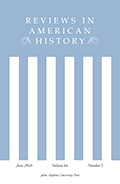Reviews in American Religious History

Paul Harvey
The new issue of Reviews in American History -- to me, the single most helpful professional periodical that I read -- brings focus to a number of titles of interest -- some we’ve blogged about here before, others not.
In “The Cult of Domesticity, Southern Style,” our friend Charles Irons reviews Scott Stephan’s Redeeming the Southern Family: Evangelical Women and Domestic Devotion in the Antebellum South, a book that has quite unaccountably escaped our notice here. This work focuses intensively on domestic piety among a fairly elite class of white southern women. The home was the site of “many of their most significant religious experiences,” and the women Stephan studies put their suitors through a gauntlet of domestic devotion trials, remaining reserved while their courters strutted their evangelical bona fides. In the end, Irons concludes, Stephan shows that “white evangelical women found the process of reforming their own households to be extremely fulfilling,” while “more work is required to evaluate whether and why these domestic reformers were so wary of shining their light outside of their homes.”
Since we've missed discussing this work before, here's just a bit more about it, from the book's website:
In the years leading up to the Civil War, southern evangelical denominations moved from the fringes to the mainstream of the American South. Scott Stephan argues that female Baptists, Methodists, and Presbyterians played a crucial role in this transformation. While other scholars have pursued studies of southern evangelicalism in the context of churches, meetinghouses, and revivals, Stephan looks at the domestic rituals over which southern women had increasing authority-from consecrating newborns to God's care to ushering dying kin through life's final stages. Laymen and clergymen alike celebrated the contributions of these pious women to the experience and expansion of evangelicalism across the South. This acknowledged domestic authority allowed some women to take on more public roles in the conversion and education of southern youth within churches and academies, although always in the name of family and always cloaked in the language of Christian self-abnegation. At the same time, however, women's work in the name of domestic devotion often put them at odds with slaves, children, or husbands in their households who failed to meet their religious expectations and thereby jeopardized evangelical hopes of heavenly reunification of the family. Stephan uses the journals and correspondence of evangelical women from across the South to understand the interconnectedness of women's personal, family, and public piety. Rather than seeing evangelical women as entirely oppressed or resigned to the limits of their position in a patriarchal slave society, Stephan seeks to capture a sense of what agency was available to women through their moral authority.
Sara Dwyer-NcNulty reviews our blog contributor Kathleen Sprows Cummings’ New Women of the Old Faith: Gender and American Catholicism in the Progressive Era (the link takes you to our previous post on Kathy's book). The review gives a thorough summary of the volume, and concludes with this reflection on Catholicism and gender: “The Catholic women under examination [the major figures studied by Cummings] did not seek to form an association of work together unless they had to. Gender was subordinate to religious identity. It appears, however, that rejecting gender was only required of women. For men, gender was (and is) paramount, and it was gender that guaranteed men’s access to power.”
Briefly, and off-topic, but interesting in conjunction with this: I can't help but compare those thoughts above with the interview with Sinead O'Connor on NPR today, who reflects on her famous television appearance in 1992 which was controversial then (ripping up a picture of the Pope, and all, you remember), but now appears prescient in terms of highlighting the issue of abuse. In the interview, she says,
"A lot of people misinterpret me and think I'm somehow anti-Catholic, and I'm not," she says. "I've acted out of a passionate love of the Holy Spirit and what is good about Catholicism. ... I have nothing but respect for any priest and nun that I've ever met. ... They've been disrespected and misrepresented. I think there's so much that's beautiful about Catholicism, but that has been clouded by the cover-up more even than the abuse."
She questions the beliefs of those in the church who would hide abuse: "[It's] as if they don't believe in God. They certainly don't believe in a God that is watching them or what they're doing."
To go on: Matthew Grow provides an assessment of a book we’ve discussed at length here before: Jared Farmer’s ON Zion’s Mount: Mormons, Indians, and the American Landscape. Farmer's interview about his book, at Religion Dispatches, can be found here.
Finally, Julian Zelizer of Princeton University provides a long, thorough, and synthetic set of reflections on the various historiographical "waves" of the study of American conservatism. While focused mostly on policy debates and not religious history, Zelizer has a section dealing with conflicts and divisions within contemporary conservatism, including the disappointment felt by religious conservatives in recent years in the public policy arena; well worth checking out.

Comments